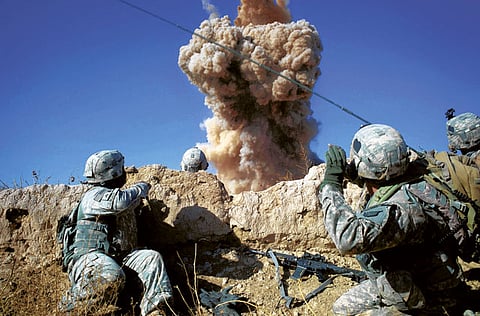Taliban gain from US mistakes
Sacrilegious acts of foreign troops have given militants an upper hand

Kabul: Lately, it has seemed that the Taliban can just sit back and wait for the next American mistake.
Over the last three months, a series of highly damaging events has forced US commanders and officials to adopt a posture of nonstop crisis management.
Even so, the insurgents have not taken full advantage of the American setbacks, in part because the movement appears divided over its own strategy.
This month, the Taliban leadership abruptly suspended preliminary peace contacts with the Americans, a move seen by some as tactical and temporary, but interpreted by others as reflecting internal argument over whether negotiations were even worthwhile at this point.
Within the movement, some believe it might make more sense to wait out the US military presence rather than come to the bargaining table. The insurgents are well aware of growing calls in the US for a sped-up pullout from Afghanistan, calls that intensified after the massacre of 17 villagers in Kandahar province, in which a US Army staff sergeant has been charged.
Heading into the spring "fighting season", some Taliban field operatives boast that large-scale attacks might not be needed to erode Western forces' sway, especially in rural districts where American troops were disliked and distrusted even before the Kandahar killings.
It appeared a different story as 2012 began and the Taliban announced its readiness to open a liaison office in Qatar.
US officials characterised the move as the most definitive sign yet that the insurgents were ready to begin steps toward forging a political accord to end the decade-old war.
Weeks later, an inflammatory video emerged of US Marines urinating on what were believed to be the bodies of dead Taliban fighters. In February, the apparently mistaken burning of copies of the Quran at a US base triggered a week of deadly riots across Afghanistan. And on March 23, Army Staff Sgt. Robert Bales was charged with 17 counts of premeditated murder in the shootings in Kandahar's Panjwayi district on March 11. Nine of the victims were children.
"The Taliban are benefiting from these incidents," said Mullah Abdul Hakim Mujahid, a former Taliban envoy who is now a member of Afghanistan's High Peace Council, which is trying to draw the insurgents into talks. Others, though, see any benefit to the insurgents as short-lived. "I don't think the US should completely lie down and play dead because of this tragedy," said Daoud Sultanzoy, a former lawmaker who is now a broadcaster and analyst.
As the formal charges against Bales were presented, the Taliban scoffed at the notion that any punishment meted out by the US military would fit the crime and revived claims put forth by some Afghan officials and villagers that many American troops had taken part in the attack.
The military says Bales is the sole suspect. In a statement posted on its website recently, the Taliban called the Quran burning and the Kandahar shootings part of a pattern of atrocities that would naturally affect "the atmosphere of negotiations", signalling, perhaps, that US concessions would be needed to revive any dialogue. A well-worn weapon in the Taliban arsenal is that of depicting the government of President Hamid Karzai as an American lap dog.
Seeking to dispel any such image, the Afghan leader has recently taken a particularly combative stance towards his US patrons, calling for American forces to withdraw from rural areas.
In the Taliban heartland of the south, fighters are beginning to mobilise for the upsurge in battlefield activity that normally accompanies warming temperatures. But one field commander in Kandahar province, who has a small cell of fighters reporting to him, said there was no need to make major battlefield sacrifices simply to harry an enemy already in retreat. "Look at what we can do to them with [roadside bombs] that kill them as soon as they leave their bases, and by reminding people in the villages what great harm the foreign forces do in this country," he said. "No one can say that is not the truth."



